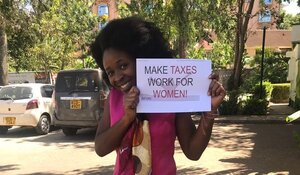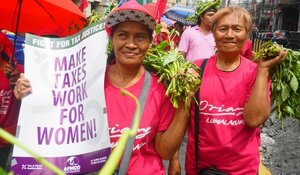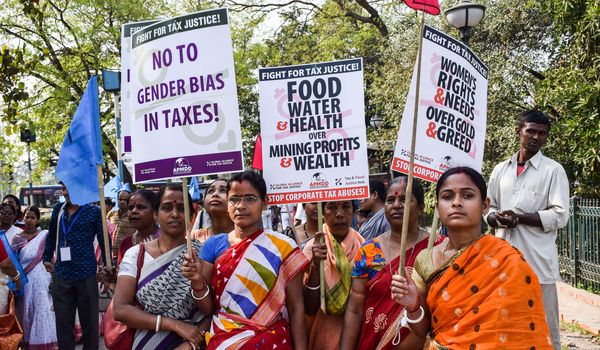Covid-19 is revealing and exacerbating gender and economic inequalities. The entire world is going through an extraordinary emergency. The last time the world faced a disease of such rapid and dire impact as Covid-19, was a century ago when an influenza pandemic claimed tens of millions of lives. As the pandemic sweeps through the nations of the world, all countries at all levels of development have been impacted and the disease is exacerbating systemic inequalities in the current social and economic systems. Every single citizen of the world stands threatened by COVID-19 but women at the intersections of inequalities of gender, race, age, sexual orientation, disability and socioeconomic status are disproportionately bearing the brunt. This is due to decades of privatisation and austerity measures promoted by capitalist policies and patriarchal systems of oppression resulting in underfunding of social sectors including health and education systems, weak governance, rapid increases in public debt and large infrastructure deficits. The crisis has also exacerbated the weak monetary and fiscal systems in developing countries, which have a limited fiscal capacity to respond. The reduced economic activities as a result of the loss of export earnings and commodity price collapses has seen a decline in tax revenues. This is the result of trade liberalisation which has reshaped economies and relegated developing countries to mainly producing and exporting primary commodities and importing manufactured goods and now impacted by the drop in the price of commodities.
What COVID-19 revealed on Gender and Tax Justice
Tax justice means that taxes are fairly raised and fairly spent. Yet, the current neoliberal system continues to entrench a broken international financial architecture that enables illicit financial flows, tax evasion and avoidance by the rich and multinational corporations (MNCs). This broken tax system allows MNCs to minimise their taxation by shifting their profits to offshore tax havens. The report of the High-Level Panel on Illicit Financial Flows from Africa estimated that the continent is deprived of US$50 billion per year due to illicit financial flows. At the global level, UNCTAD has estimated that one type of corporate tax avoidance alone is costing developing countries around US$100 billion per year, and thus the total loss can be assumed to be significantly higher. This has resulted in severely undermining the capacity of states to generate domestic resources required to invest in public services. When public services are starved of funding, and when taxes aren’t fairly collected and spent, it is women and girls living in poverty who pay the highest price. Poverty is sexist and so is the distribution of extreme wealth. Globally 9 out of 10 billionaires are men. Transferring and redistributing wealth through taxation has the potential to tackle systemic discrimination.

The crisis has also revealed the weak public health systems which are understaffed and poorly resourced due to decades of underfunding and privatisation. Developing countries are witnessing the vulnerability of privatized and discriminatory health systems, and COVID-19 is increasing the pressures on the already unresponsive public healthcare systems. More tax-funded, public investment in women and girls’ right to health is desperately needed. The crisis has also revealed that access to education via online channels remains differentiated, for many children especially girls in developing countries cannot afford internet platforms. Education is one of the strongest tools a government has to reduce inequality, lifting up the poorest citizens and levelling the playing field. A progressive taxation and spending system can raise significant revenue. Publicly funded and provided education has the most transformative potential. Tax Justice also helps reduce women’s and girls’ unpaid care burden. Women spend 2.5 times more time performing unpaid care and domestic work than men, which has been valued at US $10 trillion a year, or some 13% of global GDP. The pandemic has also revealed and deepened existing gaps in social protection systems and has also translated into an intensified care burden for women. This has resulted in increasing the underpaid and unpaid care work and reinforcing patriarchal norms for women.
The crisis has also increased the incidence of gender-based violence. Tax justice funds services which respond to violence against women and girls even as patriarchal norms continue to undermine, subvert and ignore women’s rights policy and practice. This is leaving services which respond to and seek to prevent and mitigate violence against women and girls chronically underfunded, or not funded at all. Governments must invest in tax-funded public services to meet their international and national commitments on eliminating all violence against women and girls.
Including a gender perspective in tax policy responses to COVID-19
The Covid-19 pandemic has created an opportunity to address some of the underlying principles of the dominant tax capitalist system and highlighted the need for structural and systemic reforms: we need redistributive justice, including progressive taxation reforms, where the wealthy elite and multinational companies pay their fair share. It's about creating an opportunity to re-examine fiscal and economic-policy priorities and creating alternatives to the current economic model. Governments need to ensure people-centred policy responses and recovery that take into account gender and intersectional dimensions of the impact of the crisis. Governments also need to re-centre and revalue the care economy by ensuring that tax policies recognise, represent, reduce and redistribute unpaid care work and creating universal care, provision of immediate assistance and social protection systems for vulnerable populations working in the informal sector and those living in informal settlements. Moreover, governments can also repeal value-added tax and consumption taxes, the provision of tax credits to small and middle enterprises and low-income earners and progressively raise and spend tax revenues to address the impacts of the crisis and provide quality public services, including by gender-responsive budgeting.

Administrations have demonstrated unprecedented agility in responding to the crisis with extraordinary measures and schemes announced to mitigate the worst effects. On the one hand, this demonstrates that change is both possible and desirable: it leaves the logic of a decade of ‘market-correcting’ austerity in tatters and acknowledges that in the face of crisis, things can change fast. Yet on the other hand, there remain some gaping holes in the government’s response efforts stemming from their lack of understanding about how gender positions women and men differently within the economy.
Recommendations
States should favour tax measures as emergency response to encourage liquidity especially for women and vulnerable groups, include for governments to delay tax filing and institute tax exemptions. In the medium term, they should consider solidarity or COVID-19 taxes for companies that are making huge profits during this time e.g. digital companies. For example, in Kenya, specific tax measures have been introduced like the reduction of value-added tax (VAT) rates from 16% to 14% to protect consumption for lower incomes. In the UK however, many of the punitive and discriminatory designs of Universal Credit continue to disproportionately impact women and low-income families, including the benefits cap and two-child limit, which means that families cannot claim more social security if they have more than two children. With child benefit also frozen and children off school, this is having serious ramifications for many families across the UK.
Governments stand a chance to respond effectively when the economic system is responsive and would therefore call for the promotion of domestic and regional tax transparency measures to identify and curb illicit financial flows and to scale-up multilateral cooperation in combating tax evasion and corporate tax abuse by reinforcing the reform of the global corporate tax system and supporting the establishment of a global tax body to establish global norms on tax rules (19 June 2020).

